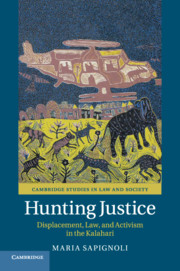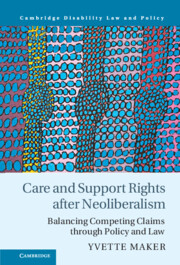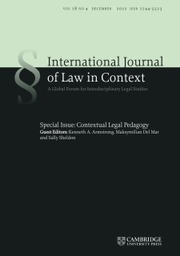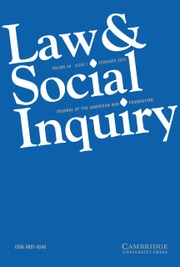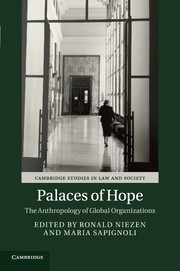Hunting Justice
Displacement, Law, and Activism in the Kalahari
Part of Cambridge Studies in Law and Society
- Author: Maria Sapignoli, Max Planck Institute for Social Anthropology
- Date Published: August 2019
- availability: Available
- format: Paperback
- isbn: 9781316642122
Paperback
Other available formats:
Hardback, eBook
Looking for an inspection copy?
This title is not currently available for inspection. However, if you are interested in the title for your course we can consider offering an inspection copy. To register your interest please contact [email protected] providing details of the course you are teaching.
-
This book presents a long-term study of the activist campaign that contested the Botswana government's much-publicized removal of the San and Bakgalagadi people from the Central Kalahari Game Reserve. Sapignoli's multiple points of observation and analysis range from rural Botswana to the nation's High Court, and a variety of United Nations agencies in their Headquarters, focusing on rights claimants and officials from NGOs, states and the United Nations as they acted on the grievances of those who had been displaced. In offering a comprehensive discussion of the San people and their claims-making through formal institutions, this book maintains a consistent focus on the increased recourse to law and the everyday experience of those who are asserting their rights in response to the encroachments of the state and the opportunities inherent in new indigenous advocacy networks.
Read more- Follows an activist campaign as it employs multiple strategies in a quest for rights and redress of grievances
- Considers the social consequences of an indigenous peoples' engagements with the law
- Offers an assessment of what works and what remains as obstacles in a justice cause
Reviews & endorsements
'The legal battle waged by the San to defend their livelihoods from a history of dispossession has made their remote villages in the Central Kalahari into an epic battle-ground for elemental human rights and values. Sapignoli's meticulous account of this contest makes plain the complex mix of actors or interests in play, the daunting odds - and ever-present threat of appropriation - arraigned against her beleaguered litigants. Yet she mounts a compelling case against too simple a dismissal of the uses of insurgent lawfare: the San hunt for justice was no simple victory; but it has reshaped them as legal subjects, enabling new visions of entitlement and possibility.' John Comaroff and Jean Comaroff, Harvard University, Massachusetts
See more reviews'The book by Maria Sapignoli is a valuable contribution to the study of activism and social justice in Africa. Starting with the San case, the ethnographic research on which this volume is based has involved, in a creative and original way, the Kalahari villages, local NGOs, the Botswana High Court, and United Nations meetings. It is rigorous and exemplary in demonstrating the importance of comparative and multi-sited analysis, rich in generative ideas and theoretical connections that are useful for understanding the wider issues of indigenous rights, beyond the case in question.' Stefano Allovio, University of Milan
'Invaluable contribution to debates on the indigenous legal turn. A powerful account of landmark litigation by San plaintiffs against Botswana after being forcibly evicted from the Kalahari. But as Maria Sapignoli explains, even a successful verdict does not ensure a favorable outcome, and may prolong rather than conclude their interactions with the legal system.' Stuart Kirsch, University of Michigan
'Hunting Justice is a well-conceived, beautifully argued, and innovative study of a southern African indigenous peoples' social justice movement. In this momentous book, Maria Sapignoli assesses human rights, law and law-making, from global, regional, national and local perspectives. Places range from the United Nations to Botswana and small communities in the Central Kalahari Game Reserve. Drawing on court records and her own long-term fieldwork, Sapignoli focuses particular attention on the perspectives of the San and Bakgalagadi who have fought long and hard to retain their existence there and to have their rights to resources and livelihoods of their choice recognized in an African state.' Robert K. Hitchcock, University of New Mexico, and member of the board of Kalahari Peoples Fund
'Sapignoli's book gives an excellent account of the complexities in the CKGR claim. It is also full of astonishing detail and up to date.' Alan Barnard, Emeritus Professor of Anthropology, University of Edinburg
'As indigenous peoples gain greater visibility in their demands for recognition and rights, a book detailing the situation of injustice faced by the San (Bushmen) of Botswana and how they took their claims to the national courts and the UN is a truly welcome contribution. In Sapignoli's meticulous and superbly evocative account, we are given an insider's story of how an ignored and abused people fought against expulsion from their homelands and took their cause internationally.' Julian Burger, University of Essex, and Former Coordinator, Programme on Indigenous Peoples and Minorities, UN Office of the High Commissioner for Human Rights
Customer reviews
Not yet reviewed
Be the first to review
Review was not posted due to profanity
×Product details
- Date Published: August 2019
- format: Paperback
- isbn: 9781316642122
- length: 439 pages
- dimensions: 229 x 151 x 21 mm
- weight: 0.65kg
- availability: Available
Table of Contents
1. Introduction
2. Unsettling the Central Kalahari
3. The 'bushman problem'
4. Getting organized: the social lives of San NGOs
5. The San in the United Nations
6. The court
7. After judgment
8. Litigating for a way of life
9. Conclusions.
Sorry, this resource is locked
Please register or sign in to request access. If you are having problems accessing these resources please email [email protected]
Register Sign in» Proceed
You are now leaving the Cambridge University Press website. Your eBook purchase and download will be completed by our partner www.ebooks.com. Please see the permission section of the www.ebooks.com catalogue page for details of the print & copy limits on our eBooks.
Continue ×Are you sure you want to delete your account?
This cannot be undone.
Thank you for your feedback which will help us improve our service.
If you requested a response, we will make sure to get back to you shortly.
×
